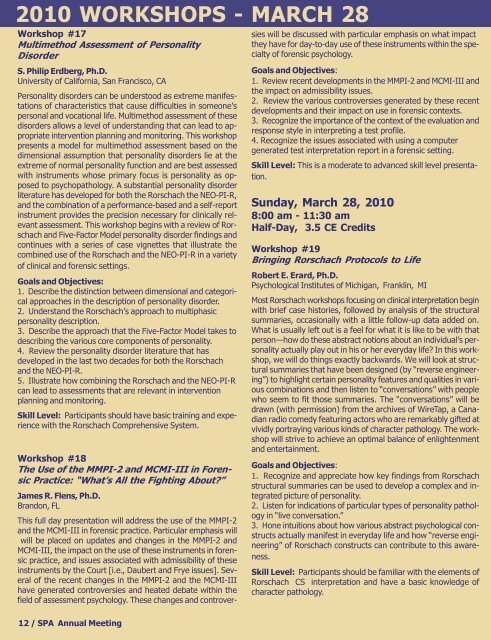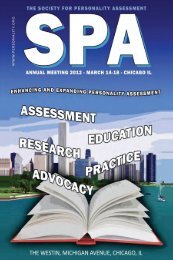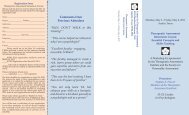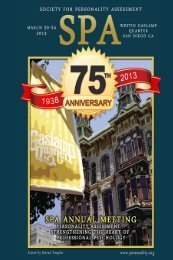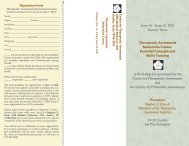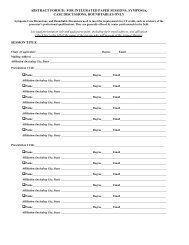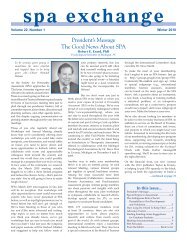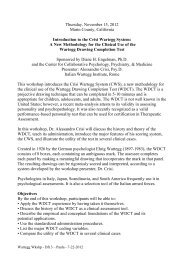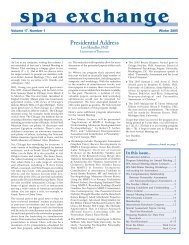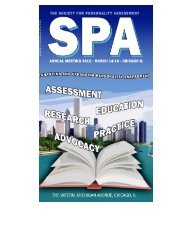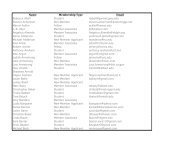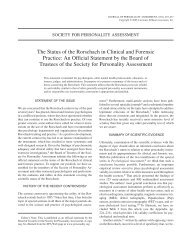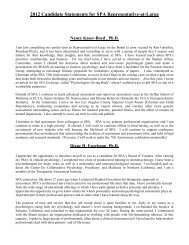From Routledge Journals - Society for Personality Assessment
From Routledge Journals - Society for Personality Assessment
From Routledge Journals - Society for Personality Assessment
You also want an ePaper? Increase the reach of your titles
YUMPU automatically turns print PDFs into web optimized ePapers that Google loves.
2010 WORKSHOPS - MARCH 28Workshop #17Multimethod <strong>Assessment</strong> of <strong>Personality</strong>DisorderS. Philip Erdberg, Ph.D.University of Cali<strong>for</strong>nia, San Francisco, CA<strong>Personality</strong> disorders can be understood as extreme manifestationsof characteristics that cause difficulties in someone’spersonal and vocational life. Multimethod assessment of thesedisorders allows a level of understanding that can lead to appropriateintervention planning and monitoring. This workshoppresents a model <strong>for</strong> multimethod assessment based on thedimensional assumption that personality disorders lie at theextreme of normal personality function and are best assessedwith instruments whose primary focus is personality as opposedto psychopathology. A substantial personality disorderliterature has developed <strong>for</strong> both the Rorschach the NEO-PI-R,and the combination of a per<strong>for</strong>mance-based and a self-reportinstrument provides the precision necessary <strong>for</strong> clinically relevantassessment. This workshop begins with a review of Rorschachand Five-Factor Model personality disorder findings andcontinues with a series of case vignettes that illustrate thecombined use of the Rorschach and the NEO-PI-R in a varietyof clinical and <strong>for</strong>ensic settings.Goals and Objectives:1. Describe the distinction between dimensional and categoricalapproaches in the description of personality disorder.2. Understand the Rorschach’s approach to multiphasicpersonality description.3. Describe the approach that the Five-Factor Model takes todescribing the various core components of personality.4. Review the personality disorder literature that hasdeveloped in the last two decades <strong>for</strong> both the Rorschachand the NEO-PI-R.5. Illustrate how combining the Rorschach and the NEO-PI-Rcan lead to assessments that are relevant in interventionplanning and monitoring.Skill Level: Participants should have basic training and experiencewith the Rorschach Comprehensive System.Workshop #18The Use of the MMPI-2 and MCMI-III in ForensicPractice: “What’s All the Fighting About?”12 / SPA Annual MeetingJames R. Flens, Ph.D.Brandon, FLThis full day presentation will address the use of the MMPI-2and the MCMI-III in <strong>for</strong>ensic practice. Particular emphasis willwill be placed on updates and changes in the MMPI-2 andMCMI-III, the impact on the use of these instruments in <strong>for</strong>ensicpractice, and issues associated with admissibility of theseinstruments by the Court [i.e., Daubert and Frye issues]. Severalof the recent changes in the MMPI-2 and the MCMI-IIIhave generated controversies and heated debate within thefield of assessment psychology. These changes and controversieswill be discussed with particular emphasis on what impactthey have <strong>for</strong> day-to-day use of these instruments within the specialtyof <strong>for</strong>ensic psychology.Goals and Objectives:1. Review recent developments in the MMPI-2 and MCMI-III andthe impact on admissibility issues.2. Review the various controversies generated by these recentdevelopments and their impact on use in <strong>for</strong>ensic contexts.3. Recognize the importance of the context of the evaluation andresponse style in interpreting a test profile.4. Recognize the issues associated with using a computergenerated test interpretation report in a <strong>for</strong>ensic setting.Skill Level: This is a moderate to advanced skill level presentation.Sunday, March 28, 20108:00 am - 11:30 amHalf-Day, 3.5 CE CreditsWorkshop #19Bringing Rorschach Protocols to LifeRobert E. Erard, Ph.D.Psychological Institutes of Michigan, Franklin, MIMost Rorschach workshops focusing on clinical interpretation beginwith brief case histories, followed by analysis of the structuralsummaries, occasionally with a little follow-up data added on.What is usually left out is a feel <strong>for</strong> what it is like to be with thatperson—how do these abstract notions about an individual’s personalityactually play out in his or her everyday life? In this workshop,we will do things exactly backwards. We will look at structuralsummaries that have been designed (by “reverse engineering”)to highlight certain personality features and qualities in variouscombinations and then listen to “conversations” with peoplewho seem to fit those summaries. The “conversations” will bedrawn (with permission) from the archives of WireTap, a Canadianradio comedy featuring actors who are remarkably gifted atvividly portraying various kinds of character pathology. The workshopwill strive to achieve an optimal balance of enlightenmentand entertainment.Goals and Objectives:1. Recognize and appreciate how key findings from Rorschachstructural summaries can be used to develop a complex and integratedpicture of personality.2. Listen <strong>for</strong> indications of particular types of personality pathologyin “live conversation.”3. Hone intuitions about how various abstract psychological constructsactually manifest in everyday life and how “reverse engineering”of Rorschach constructs can contribute to this awareness.Skill Level: Participants should be familiar with the elements ofRorschach CS interpretation and have a basic knowledge ofcharacter pathology.


